Contents
In real estate it’s all about marketing. Whether you’re an old hand or just starting out, having a solid real estate marketing plan is key to getting clients and closing deals. Here are 63 real estate marketing ideas for 2025 to help you stand out.
Key Takeaways
- A strong online presence is crucial for real estate agents. That means a consistent brand across social media, a website, and blogging.
- Video marketing, especially on social media and live sessions, can help with engagement, showcase properties, and connect with potential clients in real time.
- Combining traditional methods, like direct mail and community events, with digital tools like predictive analytics and chatbots creates a comprehensive and effective marketing strategy.
- Building strong community relationships through local events, partnerships, and engagement is vital for establishing trust and a local presence.
- Investing in evergreen content that remains relevant over time, such as guides for first-time buyers or home staging tips, can drive consistent traffic and engagement.
- Measuring and adjusting marketing strategies based on performance metrics and market changes will keep real estate agents competitive and target their audience effectively.
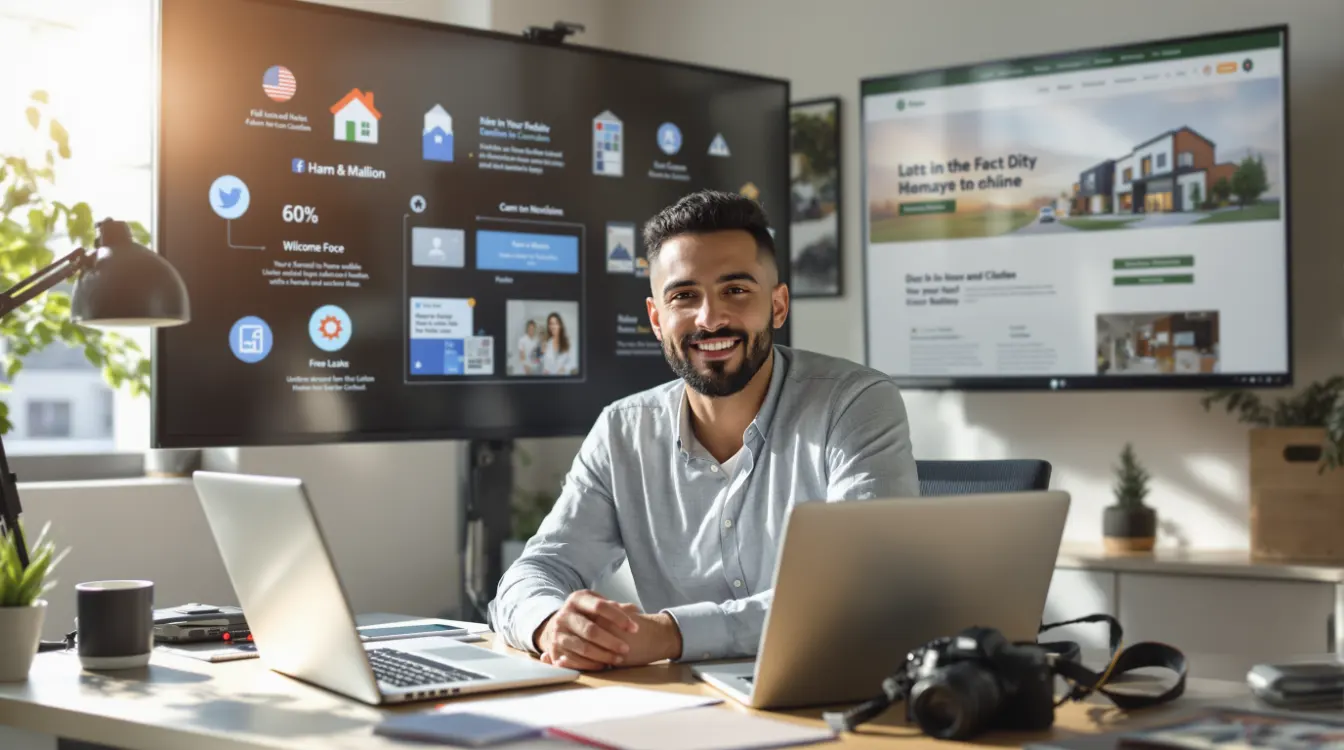
1. Build a Strong Online Presence for Real Estate Success
A strong online presence is key for real estate agents. Most home buyers start their search online so visibility online is key. A full online marketing strategy will build credibility and attract clients.
Start by securing consistent usernames across all social media platforms to build a personal brand. Your website should be search engine optimized, with local keywords and high quality photos of landmarks to improve SEO.
Don’t forget to feature client testimonials on your homepage and use professional photos in your listings to make a lasting impression. Implementing these online marketing strategies will get you leads and a strong social media presence.
2. Create a Professional Website
A professional website is a must for any real estate business. It’s your digital shopfront, showcasing your services, listings and expertise to potential clients. A good website will build your brand, trust and get you leads.
When building a website consider:
- Clean and modern design: Make it easy to use and look good.
- High quality images and virtual tours: Show properties with great visuals and virtual tours to get buyers.
- Mobile friendly and responsive: Many users are on their phones so a mobile optimized site is key.
- Clear and concise language: Get your message across with simple content.
- A clear call to action (CTA): Get visitors to contact you with CTAs.
- Use search engine optimization (SEO) techniques: Get found in search results by using keywords.
Some popular website builders for real estate agents:
- WordPress: Highly customisable with many plugins.
- Wix: User friendly with drag and drop.
- Squarespace: Sleek designs and easy to use.
Follow these and you’ll have a professional website that showcases your real estate business and gets you clients.
3. Develop Property-Specific Landing Pages
Create dedicated landing pages for individual properties to provide potential buyers with all the information they need in one place. These pages can include high-quality photos, virtual tours, floor plans, and neighborhood details to enhance the buyer experience.
Consider obtaining a unique URL for each landing page (e.g., 123MainStreet.com) to make it easy to share and remember. These URLs can be used in your marketing materials and signage, and they can also redirect to the landing page on your main website. Additionally, include QR codes on print materials like flyers or postcards that link directly to the property page, making it convenient for buyers to access the information on their mobile devices.
Using property-specific landing pages ensures a professional, tailored experience for each listing, increasing engagement and conversion rates.
Pro Tip: include the address in the URL for local SEO ranking.
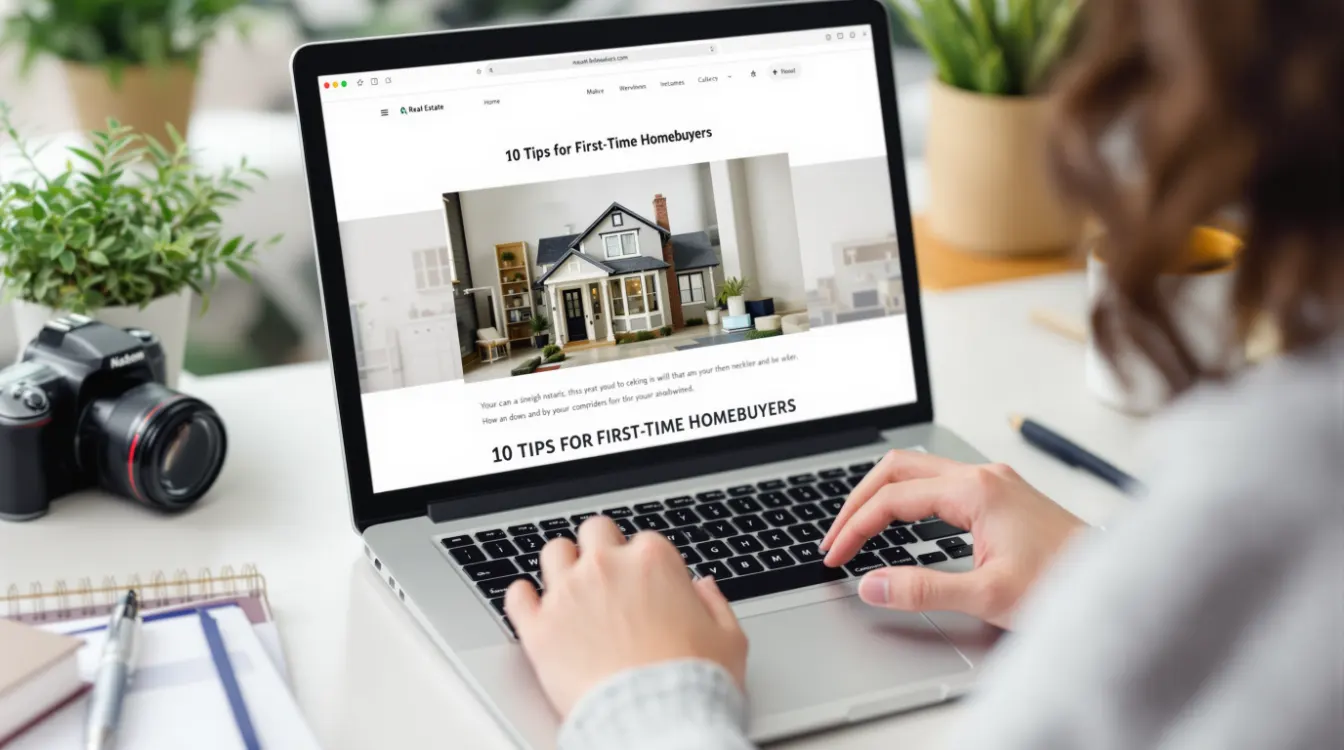
4. Start a Real Estate Blog
A real estate blog is a powerful marketing tool, allowing you to be seen as the expert in front of potential clients. Share insights, trends and practical advice and drive organic traffic to your site and reduce your reliance on paid advertising. Choose a niche and post consistently whether weekly or monthly to get maximum engagement.
Optimize your content for SEO by researching real estate keywords and including them in your posts. Use multimedia like images and videos to make your blog posts more engaging and to explain complex topics.
Share your blog posts on social media and email newsletters to get more visibility and include CTAs to convert readers to leads. These will increase your real estate knowledge and get you a loyal following.
Need help with your blog posts, we have a growing list of resources:
- The Formula for making a good-looking blog post
- Write content that will land you post in a featured snippet
- Turn email responses into blog posts with AI
- Turn your videos into blog posts
- Real Estate blog topic ideas
- The necessities of successful blogging
- Stop worrying about what Google thinks and just write
Pro Tip: Focus on creating evergreen blog content that remains relevant over time, such as “Tips for First-Time Home Buyers” or “How to Stage a Home for Maximum Appeal.” This type of content continues to attract traffic long after it’s published, making it a valuable investment in your blogging efforts.
5. Use Hyperlocal SEO for Neighborhood Branding
Target specific neighborhoods with hyperlocal SEO strategies. Optimize your content with location-specific keywords like “best homes in [Neighborhood]” or “buy a home near [Local Landmark].” Create blogs, videos, or landing pages focusing on unique aspects of the area, such as schools, parks, or local events, to attract buyers and sellers searching for properties in those areas.
6. Repurpose Evergreen Content
Get more value out of your blog by repurposing high performing evergreen content into different formats. This will breathe new life into old content and get you in front of a wider audience.
For example a blog post on “Top Home Staging Tips” can be turned into visually appealing infographics for Pinterest. You could also create Instagram carousel posts or short dynamic TikTok videos that highlight key points.
Repurposing content means your valuable content stays relevant and continues to get engagement across multiple platforms. It’s a time-saving way to get in front of more people while maximizing the value of your efforts.
Pro Tip: Regularly revisit your evergreen posts to update statistics, refresh examples, or enhance visuals, ensuring they stay current and maintain high search rankings.
7. Create Interactive Content
Interactive content is an excellent way to engage your audience and keep them on your website or social media pages longer. Engage potential clients with interactive tools like mortgage calculators, property quizzes, or neighborhood comparison charts. These features provide practical value while encouraging visitors to stay longer on your site, boosting engagement and conversion rates. Use platforms like Typeform or Canva to create easy-to-use interactive content tailored to your audience.
For example, a “What’s Your Dream Home Style?” quiz can generate leads by collecting contact information at the end. Interactive maps highlighting amenities around your listings can also enhance user experience.
By incorporating interactive content, you can create a more engaging online presence and keep potential clients coming back for more.
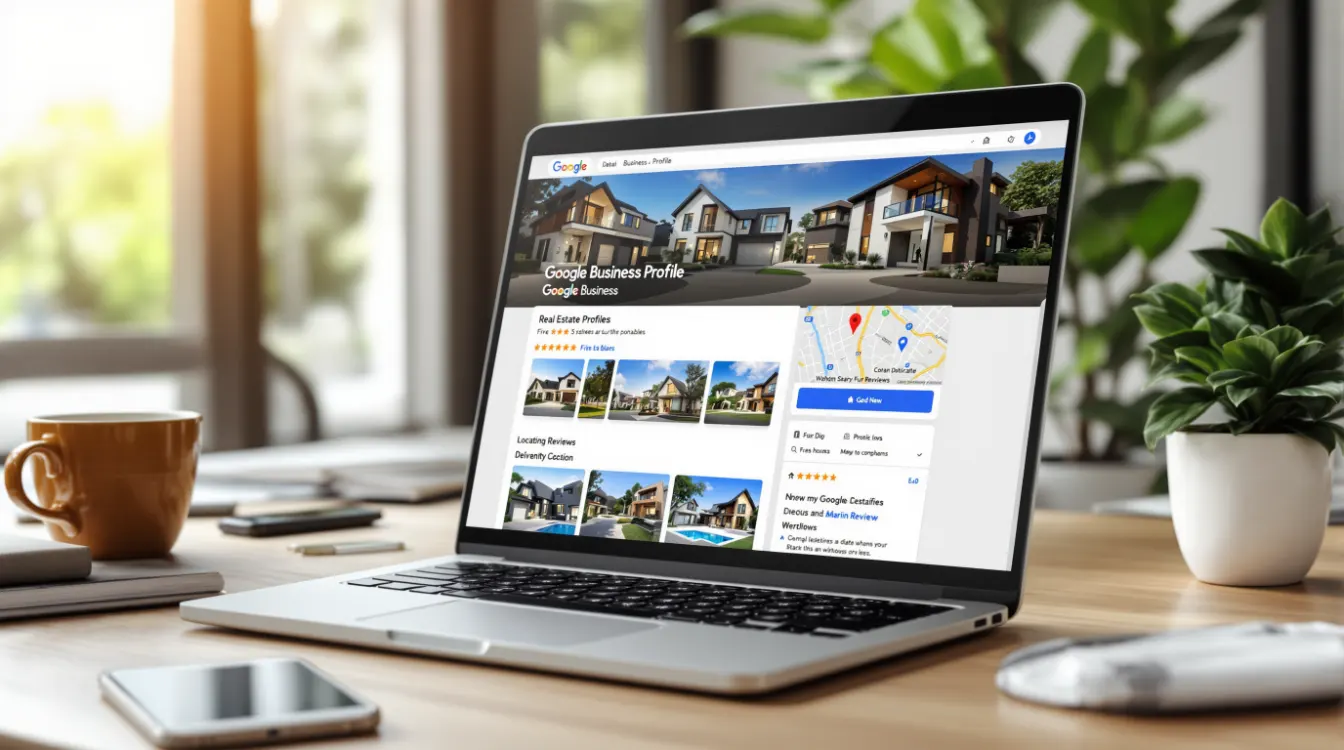
8. Optimize Your Google Business Profile
Claiming and verifying your Google Business Profile is crucial for local search visibility and to get in front of potential clients. A well optimized profile will get you more online presence and make it easier for clients to find you. Start by using high quality photos and videos and craft a well optimized business description that includes local keywords to get more potential clients.
Regularly update your profile with new posts, offers, and photos to show that your business is active. Encourage client reviews and respond to them promptly to build trust and demonstrate your commitment to excellent customer service.
Include location specific information to get in front of local searchers and boost your SEO efforts. Optimizing your Google Business Profile will get you more search engine visibility and more local clients.
9. Optimize for AI-Powered Search Engines
Get noticed on AI-driven search engines like Perplexity AI, Bing Chat, and Google Bard by making your content easy for these tools to understand.
Use tools like schema markup, a type of code added to your website, to help search engines understand your content better. For example, you can use schema markup to highlight important details such as FAQs, property listings, reviews, and location-specific information. This makes it more likely that your site will appear in rich search results or be used by AI engines to answer queries.
Create clear, straightforward answers to common real estate questions and include local keywords to ensure you appear in searches relevant to your area.
Finally, list your business in trusted directories, such as Google My Business and Yelp, as AI engines often rely on these sources to verify and rank information.
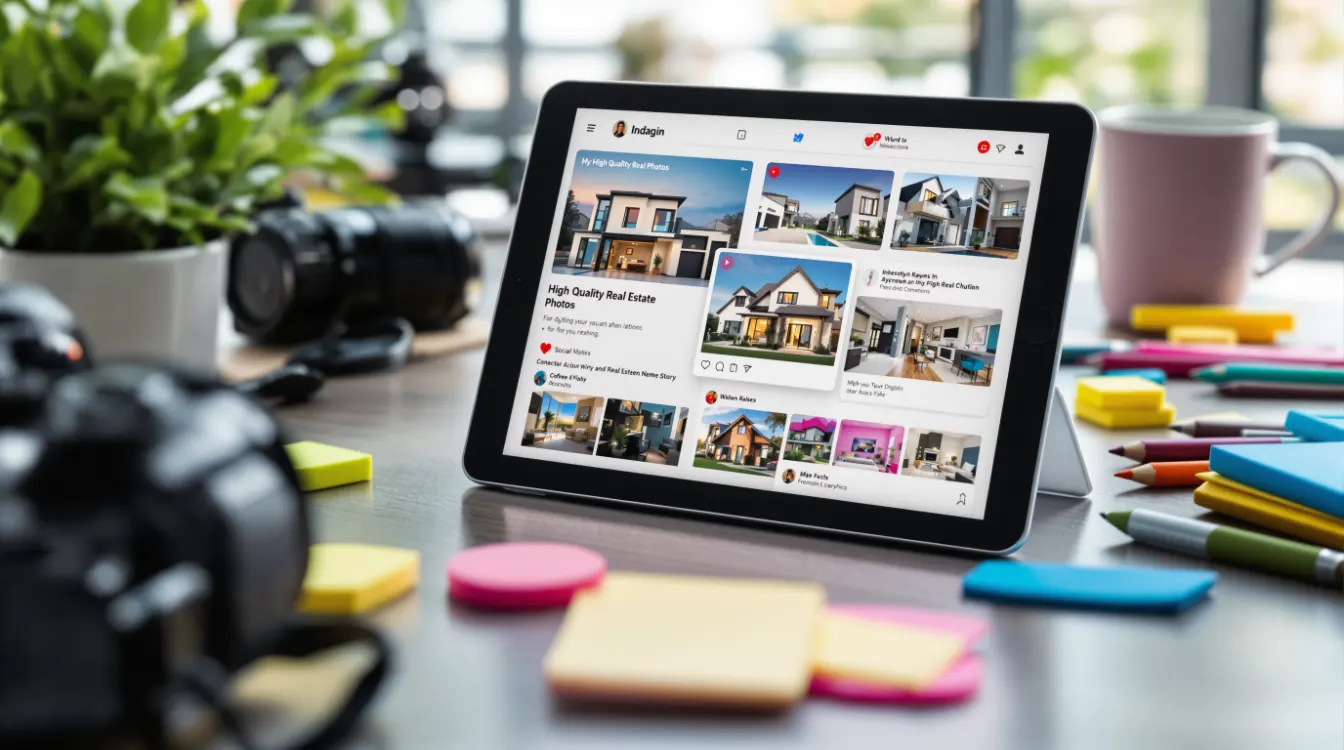
10. Create Engaging Social Media Content That Resonates
Social media is a goldmine for real estate marketing, there are endless opportunities to get in front of potential clients and showcase your listings. To create social media content, use trending memes, funny clips and interactive polls to grab your audience’s attention. Engage with your audience through storytelling and answering questions to build emotional connections and trust.
Join local Facebook groups and subreddits related to homeownership to network and answer questions from the community. Run paid promotions on social media channels like Instagram and TikTok to get more visibility and promote your listings effectively. Leveraging these strategies will enhance your social media presence and generate more leads.
11. Use Predictive Social Media Ads
Leverage AI-powered tools on platforms like Facebook and Instagram to identify and target users most likely to be interested in your properties. These tools analyze data such as user demographics, interests, and online behavior to predict potential buyers, allowing you to focus on specific groups like first-time homebuyers or families looking to upgrade.
Test different ad formats and messaging to see what resonates best with your audience. Use dynamic ads that automatically display personalized property listings based on each user’s preferences and activity, ensuring that your ads are both relevant and effective. This approach streamlines your marketing and helps you connect with serious buyers more efficiently.
12. Set Up Your Social Media Profiles
Social media is a powerful tool for real estate agents to get in front of potential clients, share listings and build their personal brand. Here’s how to set up your social media profiles:
- Choose the right platforms: Focus on the platforms where your target market is most active, Facebook, Instagram, Twitter.
- Use consistent branding: Use your logo, colour scheme and tone of voice across all your social media profiles.
- Complete your profiles: Make sure your profiles are fully completed, profile picture, cover photo and bio.
- Post high-quality content: Share high quality images and videos of properties and informative content about the home buying process.
- Engage with your audience: Respond to comments and messages quickly and use social media to build relationships with potential clients.
Some social media platforms for real estate agents include:
- Facebook: For community engagement and long posts.
- Instagram: For visual content and short videos.
- X (formerly Twitter): For quick updates and industry news.
- LinkedIn: For professional networking and industry insights.
- YouTube: For long form video and property tours.
By setting up and optimizing your social media profiles, you can get in front of and engage with potential clients, enhancing your personal brand and marketing efforts.
13. Use User-Generated Content (UGC)
Encourage and share user-generated content (UGC), such as client testimonials, photos of happy homeowners, or videos of customers showcasing their new homes. This type of content highlights real-life success stories and adds authenticity to your brand.
UGC builds trust by acting as social proof, showing potential clients that others have had a good experience with your services. It also creates a sense of community, makes clients feel connected to your brand.
To encourage participation, launch a simple hashtag campaign (e.g. #MyDreamHomeStory). This will get clients sharing their experiences and promoting your services organically across social media.
14. Post Consistently at Optimal Times
Consistency is critical for maintaining a strong social media presence. Regular posting keeps your brand visible and helps build trust with your audience.
Create a posting schedule that aligns with when your audience is most active – such as early evening or weekends. Timing your posts strategically can significantly boost engagement and reach.
Tools like Hootsuite or Buffer can streamline this process by allowing you to schedule posts in advance. This way you can stay consistent without the daily content stress, maximizing your visibility and impact.
15. Use Instagram Reels and Stories
Instagram Reels and Stories are powerful tools for showcasing your personality, providing property tours and sharing market insights to attract new clients. Running a giveaway or contest through Instagram Stories can get massive engagement. Use these features to share personal stories, market updates and client testimonials to connect with your audience.
Consistently posting engaging content on Instagram helps maintain a strong presence. Use video tours to provide potential buyers with an immersive experience, attracting new clients and keeping existing followers engaged.
16. Leverage Facebook Live
Facebook Live is great for hosting virtual open houses and Q&A sessions with potential buyers. Live streaming gives you real-time interaction, helps you build trust with potential clients by showing them daily operations and answering their questions instantly. This real time engagement can really strengthen client relationships by creating a sense of transparency and connection.
Use Facebook Live to show new listings, virtual tours and market updates. Encourage viewers to ask questions during the live sessions and respond to them quickly. This interactive approach will make your marketing more dynamic and engaging and help you
17. Utilize Local Hashtags
Incorporating local hashtags in your social media posts can enhance reach and engagement with your target audience. Using popular and relevant hashtags will get your posts in front of people interested in real estate. This will help you connect with potential clients who are actively looking for properties in your area.
Using local hashtags increases visibility within the community, helping generate leads and establishing credibility as a local expert. Engaging with local events, businesses and conversations on social media will further enhance your market presence.

18. Implement Email Marketing Campaigns
Email marketing campaigns are a cornerstone of any real estate marketing strategy. They allow you to connect with past and potential clients, increasing referrals and repeat business. A substantial recipient list is essential to receive a good return on investment in email marketing. Use on-site sign-up forms with effective calls to action to grow your email recipient list.
Adding urgency and curiosity to your email subject lines can improve open rates and increase engagement. Incorporate social media accounts and share buttons in your emails to increase cross-platform engagement. Implementing these strategies will enhance your email marketing efforts and nurture leads more effectively.
19. Offer Free Market Snapshot Reports
Provide potential clients with a snapshot of the local real estate market. Include data on recent sales, average home prices, and trends in specific neighborhoods. Offer these reports as downloadable PDFs on your website or email campaigns to generate leads and position yourself as a market expert.
20. Send Monthly Newsletters
Monthly newsletters are a great way to keep your clients informed and engaged. Include content like new listings, important announcements and market updates to give value to your audience. Use responsive design and clean layout so your newsletters look good on any device.
Make your newsletters more appealing by using beautiful photos of listings or community events. Keeping clients updated with relevant information will keep the conversation going and strengthen relationships, gets you more referrals and repeat business.
21. Develop Drip Campaigns
Drip email campaigns are a powerful real estate marketing strategy, resulting in up to 3x more clicks than regular campaigns. These campaigns can automatically send targeted content to leads based on their actions and preferences, so each lead gets relevant and timely information. New subscribers should get a welcome series with videos and written content to start the engagement process.
Interactions in email nurture campaigns should be personalized based on previous actions taken by leads. Offer incentives such as free home valuations or local market reports to get contact information from potential leads.
Integrating these strategies can significantly improve lead nurturing efforts and increase conversions.
22. Personalize Your Emails
Personalizing your emails can foster a deeper connection with clients, enhancing trust and engagement. A good email signature should have your company logo, full name, mobile number and social media links to look professional. Keep your email subject lines short and punchy to grab attention and avoid spam filters.
Include quick hit videos that answer buyer questions to get more personal with clients. This approach not only makes your emails more engaging but also establishes you as a knowledgeable resource.
Personalizing email marketing campaigns helps build stronger client relationships and increases the chances of referrals.
23. Personalize Email Campaigns with Artificial Intelligence
AI-powered email marketing tools can help you create highly personalized campaigns that adapt based on user behavior. For example, AI can send tailored emails featuring properties that match a lead’s preferences, increasing engagement and conversion rates. Tools like Mailchimp’s AI features can automate segmentation and optimize send times for maximum open rates.
Keep the content human-centered while letting AI handle the personalization at scale. This approach ensures that your emails resonate with your audience while being highly efficient in managing large recipient lists.
Leveraging AI in email marketing campaigns enhances customer relationship management and delivers better results.

24. Incorporate Video Marketing into Your Strategy
Video marketing can significantly enhance lead generation by attracting potential clients through engaging content. It’s a powerful differentiator in real estate, you can show properties in a dynamic and visually way. Creative video marketing can humanize your brand, create emotional connections and get you ahead of the competition.
Consider creating promotional videos, how-to videos and using drone photography to get amazing property shots. Educational videos can establish credibility and showcase your expertise in real estate. Adding these video marketing strategies will get you more online presence and a broader audience.
25. Create Property Walkthroughs
Property walkthrough videos provide an immersive experience, so potential buyers can see the layout and get a feel for the property. Make sure to capture listing videos with good audio and amazing visuals to make the property more appealing. Include community aspects like safety, schools, parks and local businesses to get home buyers.
Virtual staging within a walkthrough can showcase a home’s potential more effectively while saving time and money. Creating high-quality property walkthroughs offers potential buyers a comprehensive view of the property, increasing interest and engagement.
26. Leverage Augmented Reality (AR) for Virtual Property Tours
Use augmented reality (AR) to provide interactive property tours that allow potential buyers to visualize homes remotely. AR apps can showcase furniture placement, highlight renovations, or let buyers walk through a virtual home in real-time. Integrate AR features into your website or provide app recommendations to make the buying experience seamless and immersive.
Examples of AR Tools:
- Matterport: Create 3D property scans for virtual walkthroughs.
- MagicPlan: Let buyers design layouts and visualize room arrangements.
- Houzz Pro: Use AR to show furniture and decor in a space.
Pro Tip: Highlight AR tours in your marketing materials to attract tech-savvy buyers and stand out from competitors.
27. Share Client Testimonials
Video testimonials can convey client satisfaction more effectively than written feedback. Asking clients for video testimonials showcases value, builds credibility, and demonstrates client satisfaction. Place these testimonials on your website and share them on social networks to maximize their impact.
Testimonials with photos or videos are more impactful and can significantly enhance trust and decision-making for prospective clients. Sharing client testimonials in various formats establishes credibility and attracts more potential clients.
28. Host Webinars to Educate Prospective Buyers
Hosting webinars is an excellent way to share valuable insights and enhance your authority in the real estate market. Co-host a webinar to help potential buyers or sellers understand the current market and provide them with useful information. Platforms like Zoom and Webinarjam can be used to create free webinars.
Request names, email addresses, and other contact information from webinar attendees to build your contact list. Hosting informative webinars positions you as a knowledgeable resource, attracting more website visitors and potential clients.
29. Start a Podcast to Showcase Expertise
A podcast is a powerful tool for building your brand and showcasing your expertise in real estate. Create episodes that cover topics like market trends, buying and selling tips, or neighborhood highlights. Feature guest speakers like mortgage brokers, interior designers, or local business owners to add variety and attract a wider audience.
Podcasts help you connect on a personal level, offering insights in a conversational tone that resonates with listeners. Promote your episodes on social media and include them in your email campaigns to maximize reach.
By starting a podcast, you can establish yourself as a trusted voice in real estate and reach new audiences eager for expert advice.

30. Utilize Traditional Marketing Methods
Traditional marketing methods are often perceived as more trustworthy than digital. Real estate agents can use traditional media like newspapers, magazines, radio and TV for advertising. Direct mail campaigns, business cards and promotional items will keep your agency’s name top of mind with clients.
Sponsoring local events and using door hangers will get you more community presence and engagement. Integrating traditional marketing in your real estate marketing will get you more audience and build trust with potential clients.
31. Distribute Real Estate Postcards
Postcards are effective for targeting specific audiences and zip codes. Tailor your postcards to include local market reports and community listings to get more engagement from recipients. The average response rate for direct mail postcards is 2.7% to 4.4% which is higher than 0.6% for emails.
Sending postcards will be tangible reminders, agents can announce listings, share market updates and stay in touch with their community. Use high gloss paper and sophisticated design to make your mailers pop.
Sending real estate postcards will get you to your target market and get you leads.
32. Attend Local Events to Build Community Connections
Attending local events is a great way to meet new people, get your presence in the community and promote your real estate business. By attending local events like fairs, markets and charity events you can build relationships with potential clients and other community members.
Partnering with local businesses will give you networking opportunities and lead to mutual referrals and co-marketing. Giving away branded swag at events will keep you top of mind with potential clients and increase your brand visibility in the local market.
Attending local events enhances marketing efforts and builds a strong local presence.
33. Give Away Branded Swag
Offering branded swag helps in marketing by ensuring potential clients remember your business. Distributing practical branded items will increase visibility and create lasting impression with potential clients.
Give away items like pens, stress balls or coffee mugs with your logo to keep your agency top of mind and get them to refer others.

34. Leverage Technology for Lead Generation
Technology can enhance lead generation by providing tools to analyze data, communicate effectively, and create user-friendly experiences. Predictive analytics can help identify potential sellers by analyzing trends and forming targeted marketing strategies accordingly. Implementing chatbots on your website can facilitate instant communication with visitors, answering their queries in real-time and capturing leads effectively.
Optimizing for mobile ensures that visitors accessing your site via smartphones have a seamless experience, which is crucial for maintaining engagement and generating leads. Leveraging these technological tools improves real estate marketing efforts and generates more qualified leads.
35. Use Predictive Analytics
Predictive analytics employs advanced algorithms to analyze data patterns and trends in real estate. These tools assist agents in identifying potential sellers and refining marketing strategies for better targeting. By leveraging predictive analytics, real estate professionals can enhance their marketing efforts and improve client outreach.
Predictive analysis tools use historical and current data to forecast future selling probabilities of properties. Incorporating these tools into your marketing strategy helps stay ahead of the competition and identify promising lead generation opportunities.
36. Applications of Predictive Analytics in Real Estate
Predictive analytics has various applications in real estate, including property valuation, rental market analysis, and price appreciation prediction. For example, Zillow’s Zestimate uses machine learning to provide real-time property valuations based on vast datasets. Tools like HouseCanary analyze demographic and market data to identify the highest rental returns.
AI-driven predictive analytics platforms like IBM Watson analyze economic indicators and market conditions to mitigate investment risks and forecast downturns or identify high-risk opportunities. By using these tools, real estate professionals can make informed decisions and enhance their marketing efforts.
37. Predictive Lead Scoring and Qualification
AI tools can analyze vast amounts of data to predict which leads are most likely to convert. By assessing factors such as website behavior, search history, and demographic data, AI can automatically score leads based on their likelihood of buying or selling a property. This allows agents to focus their efforts on high-quality leads, improving conversion rates.
Predictive lead scoring and qualification enable real estate agents to streamline their marketing efforts and prioritize leads that have the highest potential for conversion. Incorporating these tools into your marketing strategy enhances lead generation and achieves better results.
38. Notable Tools and Models for Predictive Analytics
Several tools and models for predictive analytics can benefit real estate professionals. A few notable options to consider:
- HouseCanary: Provides accurate property value predictions and market forecasts using AI and big data.
- Reonomy: Offers AI-powered market analysis and comprehensive property data for commercial real estate.
- SmartZip: Uses predictive analytics to identify likely sellers and automates targeted marketing campaigns.
Using these tools helps real estate agents enhance marketing efforts and make informed decisions as a real estate agent, staying ahead of market trends and identifying promising lead generation opportunities.
39. Leverage Geotargeted Advertising
Geotargeted advertising lets you deliver ads directly to people in specific geographic areas, making it an excellent strategy for connecting with potential clients in key neighborhoods. Platforms like Google Ads, Facebook, and Instagram offer tools to define your target areas by zip code, city, or even a radius around a specific point.
For example, you can target renters in areas with high turnover rates or promote open houses to local buyers within a specific distance. Geotargeted ads also work well for seasonal promotions or highlighting local market expertise. Ensure your ad copy and visuals are tailored to the audience in the selected area to maximize impact.
40. Run Retargeting Ads to Reengage Visitors
Set up retargeting campaigns on platforms like Facebook or Google Ads to reach users who have visited your website but didn’t take action. Create ads with tailored messages, such as “Still looking for your dream home? See what’s available now!” to bring them back and convert them into leads.
41. Leverage AI for Market Analysis and Targeted Outreach
AI can analyze market trends, neighborhood insights, and buyer behavior to identify promising opportunities for lead generation. Using predictive analytics allows agents to target specific neighborhoods or demographics poised for growth or high buyer interest. Tools like NeighborhoodScout generate hyperlocal reports based on client preferences, positioning you as a neighborhood expert.
Using AI for targeted outreach ensures that your marketing efforts are focused on the most promising leads. This approach can significantly enhance your lead generation and client engagement, helping you attract more qualified leads and close more deals.
42. Nurture Leads with AI-Enhanced CRMs
AI-enhanced customer relationship management (CRM) systems can automate follow-ups through personalized drip campaigns via email or SMS. These systems track lead engagement and adjust communication strategies based on user behavior, ensuring that leads remain engaged throughout their buying journey.
Set up automated workflows in your CRM that trigger follow-ups based on actions like email opens or website visits. This keeps leads engaged without requiring constant manual input from agents. Using AI-enhanced CRMs nurtures leads more effectively and improves conversion rates.
43. Implement Chatbots
Chatbots provide instant response to customer inquiries, improve engagement and reduce wait time. They can operate 24/7, support multiple languages to cater to diverse clients. Chatbots are a powerful tool in real estate marketing, offering numerous advantages such as improving customer engagement and satisfaction.
Place your chatbot prominently on your website and social media pages to maximize engagement. Program it to ask qualifying questions to gather key information for lead nurturing.
Implementing chatbots ensures no lead is missed, even outside of business hours.
44. Mobile Optimization
Mobile optimization is important because:
- 59% of users now browse real estate websites on their smartphones.
- It ensures a seamless user experience on smartphones.
- Features like large buttons and a home search tool enhance usability on mobile devices.
Google’s mobile first indexing algorithm mandates that mobile websites to be optimized for SEO. This is important for visibility and performance in search results. Mobile optimization will improve user experience, increase engagement and get more leads from mobile users.
45. Automate Content with AI
AI can streamline the creation of marketing materials such as property brochures, social media posts, and virtual staging. For example, AI tools can automatically generate property brochures by pulling data from your MLS or CRM systems and updating them in real-time as property details change. This saves time while ensuring your materials are always up-to-date.
Use tools like Canva’s design assistant to create visually appealing marketing materials quickly and efficiently. Automating content creation with AI allows more focus on strategic tasks and less on manual updates, enhancing overall marketing efficiency.
Pro Tip: Always review AI-generated results for accuracy, as mistakes can happen. Add your unique insights and expertise to make the content truly your own—AI provides a foundation, but your knowledge is what sets you apart.

46. Engage with Local Communities to Build Relationships
Engaging with local communities is essential for enhancing your visibility and building strong relationships with potential clients. By being present and active in your neighborhood, you can establish trust and position yourself as a resource for the community.
Actively participate in local events, sponsor community activities, or volunteer with neighborhood organizations to foster strong connections and establish yourself as a trusted local expert. For example, host a booth at a local farmers’ market or organize a cleanup day to engage directly with residents. These efforts not only boost your brand’s visibility but also demonstrate your commitment to the community, making you a go-to real estate agent in the area.
Pro Tip: Collaborate with local community bloggers or influencers to write guest posts about neighborhood events or market trends. This partnership can expand your visibility and position you as a trusted local expert.
47. Partner with Local Vendors
Partnering with local businesses can promote listings and help with open house participation. Collaborating with local businesses can lead to mutual referrals and joint marketing efforts. Building brand recognition with local businesses helps spread word-of-mouth and drive referrals.
Determine discounts on goods offered to home buyers as a way to collaborate with local businesses. You can also set up pop-up shops in different rooms during open houses to encourage prospects to visit.
Partnering with local businesses enhances marketing efforts and builds strong community relationships.
48. Join Local Facebook Groups
Joining and being active in local Facebook groups will allow real estate agents to showcase their knowledge and connect with community members. Participating in these groups will build credibility, get visibility and stay top of mind with the community.
Engaging with local events and discussions in these groups will create personal connections and credibility in the community. Being active and providing service in local Facebook groups will keep you memorable to community members and get more leads.
49. Host Community Events
Hosting community events is a fantastic way to connect with potential clients and showcase your local expertise. Events like neighborhood tours and historic home walks allow you to engage with your community while highlighting your knowledge of the area. Transform your open houses into themed extravaganzas, such as a summer BBQ or holiday market, to attract larger crowds and create memorable experiences.
Pro Tip: For neighborhood tours, identify properties to visit, obtain permissions, and create a clear route. Utilize social media to promote the event and consider livestreaming for wider reach.
50. Host a Buying Seminar for Prospective Buyers:
Buying seminars provide an opportunity to educate first-time buyers and position yourself as a trusted expert in the real estate process. Address common concerns about the buying journey and offer valuable insights into local markets, financing options, and the steps to closing.
Pro Tip: Partner with guest speakers such as mortgage brokers or real estate attorneys to add credibility and attract a wider audience. Use the seminar to collect contact information and follow up with personalized resources.
51. Organize Charity Events or Fundraisers
Charity events are a great way to give back to your community while establishing your brand as compassionate and socially responsible. Sponsor or host charity drives, donation events, or silent auctions in partnership with local nonprofits or schools to maximize your outreach.
Pro Tip: Promote your involvement in charitable causes through social media and newsletters to inspire trust and goodwill among potential clients.
52. Relocation Meet-and-Greet
Relocation meet-and-greets are designed specifically for newcomers to the area, offering them a chance to meet neighbors, learn about local amenities, and ask questions. These events position you as a neighborhood expert while providing valuable resources like maps and business directories.
Pro Tip: Partner with local businesses to offer discounts or giveaways for attendees, making the event both helpful and memorable.
53. Partner with Relocation Companies
Collaborate with relocation companies to connect with clients moving into your area. Offer customized services like virtual tours, neighborhood introductions, and moving assistance to make their transition smoother. This partnership helps tap into a consistent stream of motivated buyers.
54. Develop an Online Course for Buyers or Sellers
Online courses are a scalable way to educate buyers and sellers while positioning yourself as a real estate expert. Create modules that guide participants through the buying or selling process, covering topics like budgeting, navigating contracts, and staging homes.
Include video lessons, downloadable resources, and quizzes to make the course interactive and informative. Promote the course on your website and social media, and consider offering it for free to build goodwill or charging a nominal fee for added value.
An online course provides a long-term resource that attracts and nurtures leads while showcasing your expertise.
55. Creative Community Engagement Ideas for Real Estate Agents
- Pet Adoption Events:
- Partner with local animal shelters to host adoption drives at your listings or community spaces. This fosters goodwill while attracting families and animal lovers.
- Seasonal Community Events:
- Host events like pumpkin patches in the fall or holiday gift drives in the winter. These events provide opportunities to meet new clients in a relaxed, festive environment.
- Home Maintenance Workshops:
- Collaborate with contractors or DIY experts to teach homeowners about basic maintenance tasks, such as winterizing their homes or improving energy efficiency. These workshops position you as a helpful local resource.

56. Offer Unique Client Services to Stand Out
Offering unique client services will set you apart from other real estate agents and create memorable experiences for your clients. Determine your Unique Selling Proposition (USP) by evaluating what makes you unique and the value you provide to customers. Referrals are considered high-quality leads because they come with a higher level of trust and familiarity. By providing exceptional services, you can increase the likelihood of referrals from past clients.
Having a unique signature item or look can create a recognizable and memorable personal brand. Implement different marketing concepts to inspire creativity and innovation in your real estate marketing efforts. Offering unique client services attracts more clients and builds a strong market reputation.
57. Provide Concierge-Level Service
Providing concierge-level services can significantly enhance client satisfaction and drive referrals. Examples of concierge-level services can include such things as:
For Buyers
Help buyers settle into their new home by:
- Setting up utilities
- Hiring professional cleaners
- Arranging lawn care or snow removal
- Sending pizza delivery on moving day
- Providing housewarming gifts like gift cards or plants
For Sellers
Assist sellers in preparing their homes for sale by:
- Coordinating staging and photography
- Managing minor repairs or home improvements
- Hiring landscapers to improve curb appeal
- Scheduling deep cleaning services
- Providing packing or moving assistance
Following up after closing keeps relationships strong and encourages referrals. Offering these services shows clients that you value their needs and are willing to go the extra mile.
58. Offer Virtual Consultations
Virtual consultations are a modern way to connect with potential clients and provide personalized service without requiring an in-person meeting. Use video conferencing tools like Zoom or Google Meet to discuss buying or selling goals, provide market insights, or review listings in detail.
Virtual consultations are especially helpful for clients relocating from another area or those with tight schedules. They demonstrate flexibility and commitment to client convenience, which can set you apart from competitors.
By offering virtual consultations, you can broaden your reach and make real estate transactions more accessible for everyone.
59. Send Handwritten Notes to Build Personal Connections
Sending handwritten notes is another great way to provide a memorable experience that sets you apart from competitors. A personal touch when clients receive a handwritten note in the mail strengthens relationships and shows you care. Using services like Handwrytten allows for automated sending of personalized handwritten cards, making it easier to maintain this personal touch.
Sending handwritten notes creates a lasting impression and fosters client loyalty, building strong relationships and encouraging referrals.
60. Deliver Pop-By Gifts to Stay Top-of-Mind
A pop-by gift is a small, thoughtful gift delivered to clients’ homes, helping to reconnect with clients and strengthen relationships. Consider giving practical promotional items like pens, stress balls, or coffee mugs for pop-by gifts. Gifts that reflect the season can reinforce client relationships and show appreciation.
A well-chosen gift can encourage clients to refer friends and keep your agency on their minds. During pop-by visits, agents can ask clients for referrals, further enhancing their marketing efforts.
Delivering pop-by gifts builds stronger client relationships and increases the likelihood of referrals.

61. Create a Real Estate Marketing Plan That Drives Results
A real estate marketing plan is your roadmap to success. Outline a strategy that includes your goals, target audience, and the specific tactics you’ll use to reach them. Break down your plan into actionable steps, such as creating a content calendar, setting up digital ad campaigns, or scheduling community events.
Pro Tip: Keep your plan flexible to adapt to changes in the market or audience preferences.
62. Define Your Target Audience and Niche
Once your marketing plan is outlined, the next step is identifying who you’re marketing to. Determine your ideal client and narrow your niche to focus your efforts effectively.
- Identify Your Audience:
- Are they first-time homebuyers, luxury property seekers, or downsizing retirees?
- Consider demographics like age, income level, and family size.
- Define Your Niche:
- Are you specializing in waterfront properties, urban condos, or historic homes?
- Focus on the unique aspects of the areas or property types you serve.
Tailoring your marketing to these specific groups ensures your message resonates and drives better results.
63. Set Clear Goals and Objectives
With your target audience and niche identified, it’s time to outline your goals. Clear objectives give you a roadmap and help measure success effectively.
- Set SMART Goals:
- Specific: Define exactly what you want to achieve (e.g., “Increase social media followers by 15%”).
- Measurable: Use metrics like website visits, leads generated, or listings sold.
- Achievable: Ensure your goals are realistic given your resources.
- Relevant: Align objectives with your broader business goals.
- Time-bound: Set deadlines to stay on track.
- Identify Your Key Performance Indicators (KPIs):
Use KPIs to track and evaluate your progress toward goals:- Website traffic: Monitor total visitors, bounce rates, and time spent on pages.
- Social media engagement: Track likes, shares, comments, and follower growth.
- Lead generation: Measure how many inquiries or sign-ups come from your campaigns.
- Email campaign success: Focus on open rates, click-through rates, and conversions.
- Sales performance: Track closed deals and revenue generated from marketing efforts.
- Some Popular Marketing Goals for Real Estate Agents Include:
- Increase website traffic: Drive more visitors to your site through search engine optimization (SEO) and online ads.
- Generate more leads: Use targeted email campaigns or social media ads to attract potential clients.
- Boost social media engagement: Post regularly and interact with followers to grow your audience.
- Improve brand awareness: Enhance your visibility through local events, partnerships, or consistent branding.
- Close more deals: Ultimately, focus on converting leads into completed sales to grow your business.
By setting clear goals and monitoring progress with KPIs, you can make data-driven decisions and continuously refine your marketing strategy to achieve better results.
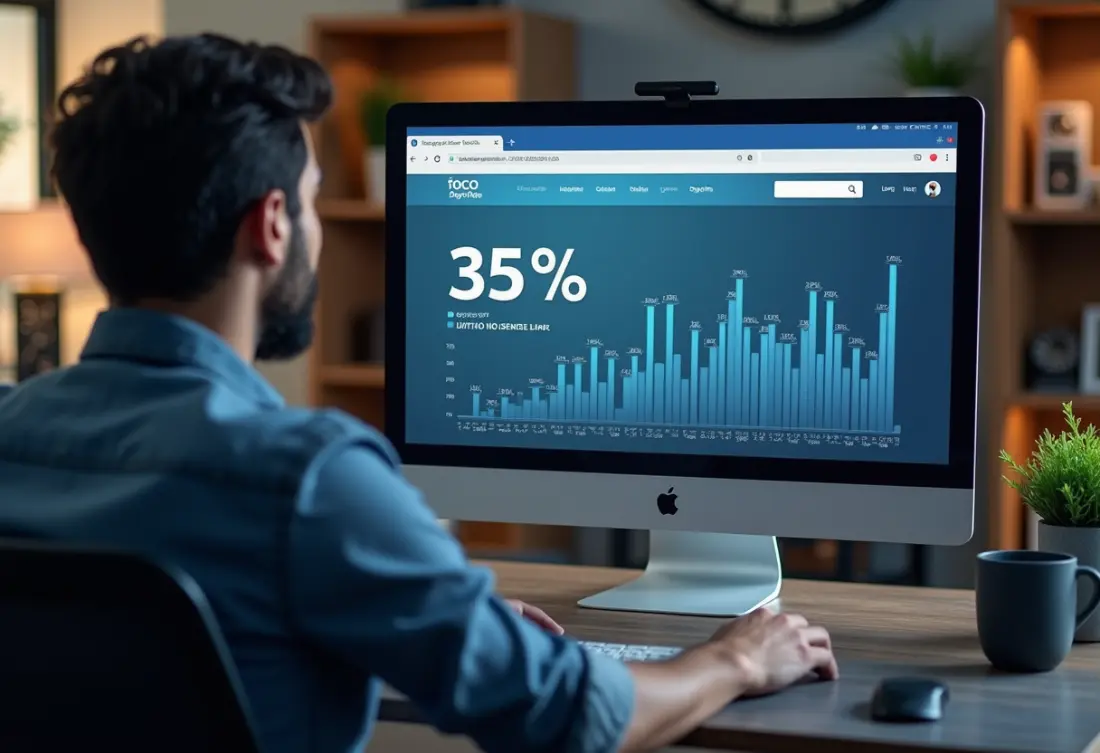
Measure and Adjust Your Strategies
Measuring and adjusting your real estate marketing strategies is essential for long-term success in the dynamic real estate market. Establishing clear goals is crucial for evaluating the success of your marketing activities. Regularly tracking metrics like sales, new leads, and activity levels helps agents gauge their marketing performance and make data-driven decisions.
Track Performance Metrics
Use tools like Google Analytics, Instagram Insights, and Facebook Analytics to monitor key metrics such as website traffic, social media engagement, email open rates, and conversions. These insights allow you to identify top-performing campaigns and areas needing improvement.
For example:
- Social Media: Track engagement rates, follower growth, and impressions to assess your audience’s response to content.
- Website: Focus on bounce rates, time on page, and conversion paths to improve your user experience.
- Email: Monitor open rates, click-through rates, and unsubscribe rates to refine your outreach.
Call tracking is another valuable tool for real estate professionals. By assigning unique phone numbers to specific ads, emails, or landing pages, you can identify which real estate marketing efforts drive the most inquiries. These insights enable you to refine your campaigns and allocate resources more effectively, ensuring maximum ROI.
Setting measurable goals, such as generating 500 new email subscribers or achieving a 10% increase in social media engagement, ensures your efforts are targeted and effective. Proactively A/B testing campaigns, like experimenting with email subject lines or different ad visuals, can further refine your strategies.
Conduct Regular Audits
Regular audits of your real estate marketing efforts are crucial for identifying strengths, weaknesses, and opportunities for improvement. Reviewing website analytics, lead conversion rates, and campaign performance helps you pinpoint areas for growth.
Act on audit findings by making targeted adjustments. For example, if a specific ad campaign underperforms, consider revising the ad copy or retargeting your audience. Consistent auditing ensures that your strategies remain competitive and aligned with your business goals.
Adapt to Market Changes
In a constantly evolving real estate market, flexibility is key. Predictive analytics can help you identify market trends, seasonal demand shifts, or areas with high growth potential. Leverage these insights to proactively tailor your strategies.
For instance:
- If website traffic shows an increase in mobile users, ensure your site is fully mobile-optimized to improve user experience.
- Use seasonal metrics to identify the best times to run promotions or open houses.
Regularly tracking performance and market trends ensures your strategies stay relevant and deliver better results, keeping you ahead of the competition.
Conclusion
As you can see, the world of real estate marketing is big and full of opportunities to innovate and stand out. By building a strong online presence, optimizing your Google Business Profile, creating social media content, and running email campaigns you can supercharge your marketing. Using video marketing, traditional real estate marketing and technology for lead gen are also key to stay ahead in the real estate game.
Being part of local communities, offering unique client services and continuously measuring and adjusting will be key to your long term success. Remember the secret to real estate marketing is to be flexible, innovative and client centric. By following these 63 real estate marketing ideas for 2025 you’ll be able to attract more clients, close more deals and build a successful real estate business. Here’s to your success!
Frequently Asked Questions
Why is having a strong online presence important for real estate agents?
Having a strong online presence is essential for real estate agents because most home buyers start their property search online. It not only boosts visibility but also establishes credibility, helping agents attract more potential clients.
How can I optimize my Google Business Profile for better visibility?
To boost your Google Business Profile visibility, focus on using high-quality photos, creating a keyword-rich business description, and consistently updating your profile with fresh posts and offers. This approach will help attract more customers!
What are some effective email marketing strategies for real estate agents?
To boost your email marketing, focus on monthly newsletters, personalized content, and automated drip campaigns. Utilizing AI tools for segmentation can really enhance your outreach!
How can video marketing enhance my real estate marketing efforts?
Video marketing can boost your real estate marketing efforts by creating engaging content that showcases properties beautifully, helping you connect emotionally with potential buyers. This approach not only attracts more leads but also differentiates you from the competition.
Why is it important to engage with local communities in real estate marketing?
Engaging with local communities boosts your visibility and builds strong relationships, making you a trusted local expert. This approach not only brings in potential clients but also enhances your chances for referrals and repeat business.
Written by : Jeff Kind
Jeff Kind- Real Estate Marketing Business: We build WordPress Real Estate Websites with IDX Me: #GoHawks, #DiverAlertNetwork, #SeattleSoftwareQualityAssuraceGroup, #SeattleHikers, #ILoveMyFamily Blog: Focuses on Wordpress Websites, Content Management, SEO Services, Social Media Marketing, Email Marketing, Beautiful Design, IDX, and more.

